Oversea adoptees face unique challenges worth discussing
Maitland Klingberg wrote this article for San Diego State’s Daily Aztec. It is available for republication or reference. If you think their work is important, you can support it here.

China’s one-child policy formally ended in 2016, yet the impact it has on international adoptees is timeless. A program that lasted nearly 40 years took away something many people hold invaluable: their basic identity.
The Chinese adoptees that I have come to know, including myself, do not know their natural parents or true birthday. Information that the majority can recall in a split second doesn’t hold true for adoptees. The one-child policy stripped us of our initial identity, and what came next was determined by an endless amount of possibilities.
There were children fortunate enough to have been taken straight to an orphanage. Others were abandoned in disturbing places, such as the gutter or a landfill.
Some never made it at all.
I feel compelled to share my story and others’ because we are miracles that should not be forgotten.
Adoption has been and will always be a big part of my life. My parents adopted me on Nov. 3, 2003 in Chongqing, which once belonged to the Sichuan province. Every now and then, my family and I watch footage, capturing the exact moment we met. Their smiles beaming as they are handed a baby girl dressed in the traditional color red. My parents claim it was the happiest day of their lives.
After two weeks of being in China, we flew home to California and adjusted to our new life together. Like all families, we have our good and bad days, but in the end, love conquers all.
My family is very open when it comes to the conversation surrounding adoption. They made sure I was comfortable with my adoptive identity from a young age. My parents prioritized
cultural exposure, enrolling me in language school, and making trips to Chinatown in downtown Los Angeles. They also stressed the importance of keeping in contact with fellow adoptees.
One individual my family kept me close to is my childhood best friend, Liana. We came from the same orphanage in the Wanzhou district. Our past has given us a unique and long-lasting friendship.
Even with a friend and supportive family by my side, adoption has not always been easy to navigate. I figured out I was adopted in preschool and did not think much of it. Now, as a young adult, I have stronger feelings about my past.
Sometimes, I look at family photos and feel like I am out of place being in them. I may be human, but mistakes are not taken lightly in my household. When I mess up, I feel like my parents would approach the situation differently if I was their biological daughter. While these feelings are not invalid, they are far from the truth. My family loves me either way and pushes me to be the best version of myself.
Thankfully, since coming to San Diego State, I have met two individuals who share a background in being adopted overseas.
Erin McClure, a psychology major second year, was adopted from the Guangdong province and offers insight about her experience.
“Adoption is just a part of all of my identity issues,” McClure said. “I didn’t think about adoption a lot in comparison to other people. I am not ashamed about my adoption and am grateful I ended up with such an easy and privileged life.”
McClure’s family has undergone the adoption process twice, adopting her younger sister from Northern China.
“My sister and I are two different people; therefore, we proceeded and reacted to it differently. However, I know I am not alone in personal experiences,” McClure said.
People who are adopted have a special journey with their identity, and McClure is taking matters into her own hands.
“I have decided to start the search for my birth parents back in China, opening a door to thoughts, emotions and experiences I never gave myself time to think about. I am doing this because I am curious about where I came from and what happened. I want to live my life, knowing I tried to find the woman who gave birth to me,” McClure said.
Carolyn, who wishes to keep her surname private for personal reasons, is a biology major first year adopted from the Hunan province, says adoption impacts her identity as well.
“The preteen to teenage years are all about figuring out who you are,” Carolyn said. “While trying to fit within the status quo, being adopted already placed me outside of that box.”
Nevertheless, Carolyn is learning how to come to terms with her past.
“I have definitely accepted being an adoptee. There are still some lingering feelings, but I’ve grown so much more into my identity.”
Finding a forever family gives individuals a second chance to discover themselves. Although there are issues that come from not being with your birth family, the rewards outweigh the struggle.
Maitland Klingberg is a freshman studying finance.



